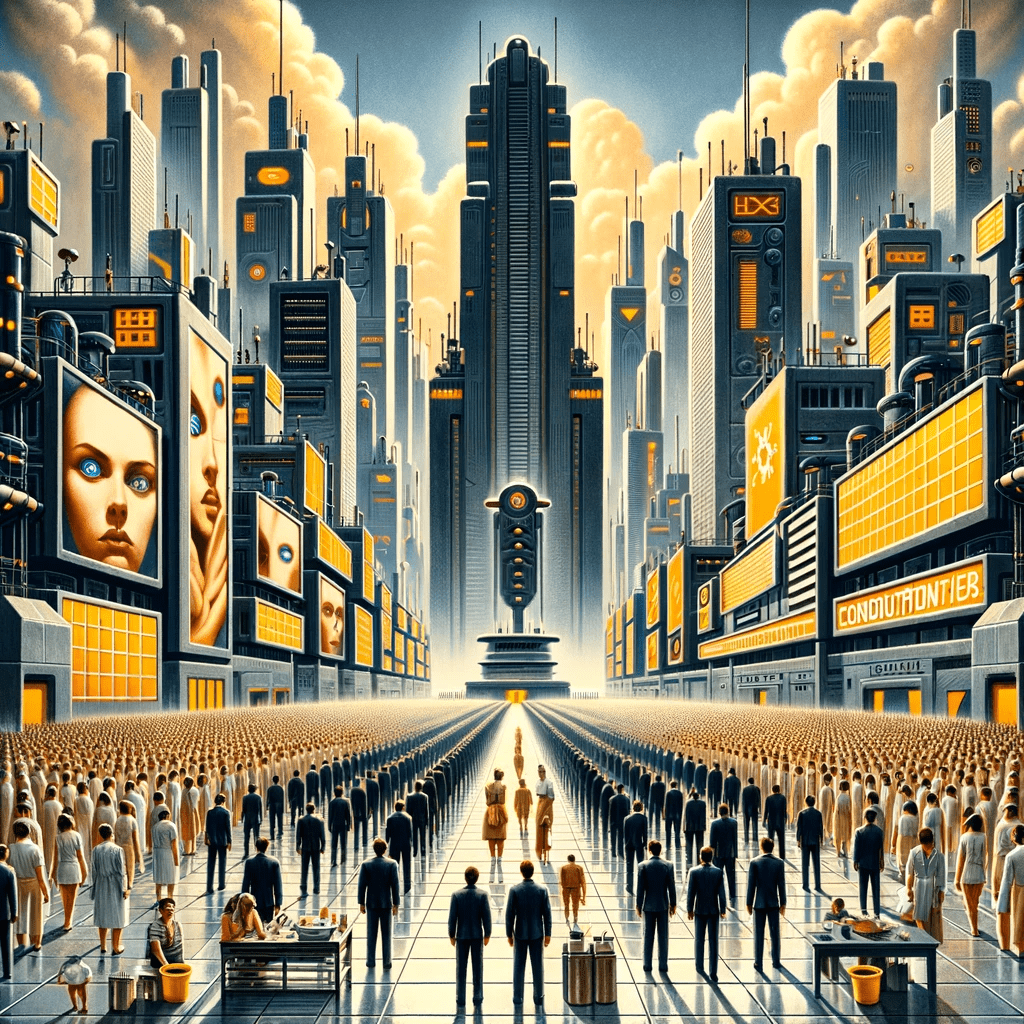Brave New World

“Brave New World” is a dystopian novel written by Aldous Huxley, published in 1932. The story is set in a futuristic society called the World State, where human beings are mass-produced, conditioned, and controlled to maintain social order and stability. The novel explores themes of individuality, freedom, and conformity, as well as the consequences of technology and progress.
The plot follows a few main characters, including Bernard Marx, Lenina Crowne, and John the Savage. Bernard Marx is a member of the upper caste but feels alienated because of his physical stature, which is considered inferior. Lenina is a nurse who has been conditioned to adhere to societal norms, but she becomes a love interest for both Bernard and John. John, on the other hand, is a man born outside the World State in a “Savage Reservation,” where people still live according to pre-World State values. The novel follows their lives as they navigate the World State’s culture and struggle to find their places in this highly controlled society.
In many ways, our society has started to resemble the World State:
- Consumerism: Just as in the World State, our society is heavily driven by consumerism, with an emphasis on material goods and instant gratification.
- Reliance on technology: Like the World State, we have become increasingly reliant on technology for communication, entertainment, and work. This reliance has led to concerns about surveillance, privacy, and the erosion of face-to-face interactions.
- Pharmaceutical use: In “Brave New World,” citizens use a drug called soma to escape from reality and suppress negative emotions. Our society has seen a rise in the use of prescription drugs, especially antidepressants and anti-anxiety medications, which some argue serves a similar purpose.
- Erosion of individuality: The World State emphasizes conformity and suppresses individuality. While our society still values individual expression, there is a growing concern that social media and other platforms can lead to a homogenization of culture and ideas.
- Genetic engineering and reproductive technology: Advances in reproductive technology and genetic engineering have made it possible to manipulate human traits and choose desirable characteristics for offspring, much like the process of creating humans in the World State.
- Loss of privacy: In the World State, the concept of personal privacy is virtually non-existent. In our society, the rise of social media, data collection, and surveillance technologies has led to growing concerns about the erosion of privacy and individual autonomy.
- Emphasis on superficial happiness: In “Brave New World,” the population is conditioned to avoid negative emotions and pursue superficial pleasures. In our society, there is a growing emphasis on seeking happiness through external sources, such as material possessions or social media validation, rather than finding meaning and fulfillment in deeper experiences.
- Devaluation of human relationships: The World State discourages deep emotional connections and promotes casual relationships, as meaningful relationships might lead to instability. In our society, there is a concern that social media and dating apps might be contributing to a decrease in the depth and quality of interpersonal relationships.
- Suppression of dissent: In the World State, any dissenting opinions or behaviors are suppressed to maintain social stability. While our society still values freedom of speech and expression, there is a growing concern about censorship, cancel culture, and the silencing of unpopular or controversial opinions on various platforms.
- Fragmentation of society: While the World State is highly controlled and uniform, it is also divided into castes that determine one’s role in society. Our world has seen growing inequality, and divisions based on race, nationality, religion, and socioeconomic status, which may lead to increased social fragmentation and the alienation of individuals from one another.
“Brave New World” is often interpreted as a warning about the dangers of totalitarianism. Totalitarianism is a seemingly benevolent but ultimately oppressive form of government. In this society, individual freedoms are severely limited, and the state exerts control over nearly every aspect of life, including reproduction, social hierarchy, and even emotional responses. The government in “Brave New World” uses advanced technology and psychological manipulation to maintain order and ensure conformity. The use of conditioning, the drug “soma” to suppress dissent and induce happiness, and the establishment of a caste system are among the methods employed to control the population.
Huxley’s work is often compared to other dystopian novels such as George Orwell’s “1984,” which also explores themes of totalitarianism and the loss of individual freedom. However, “Brave New World” differs in its portrayal of a society where control is maintained not through surveillance and fear, but through entertainment, distraction, and the illusion of happiness.
The novel serves as a cautionary tale, urging us to be mindful of the consequences of unchecked technological progress and the erosion of individual freedom.

